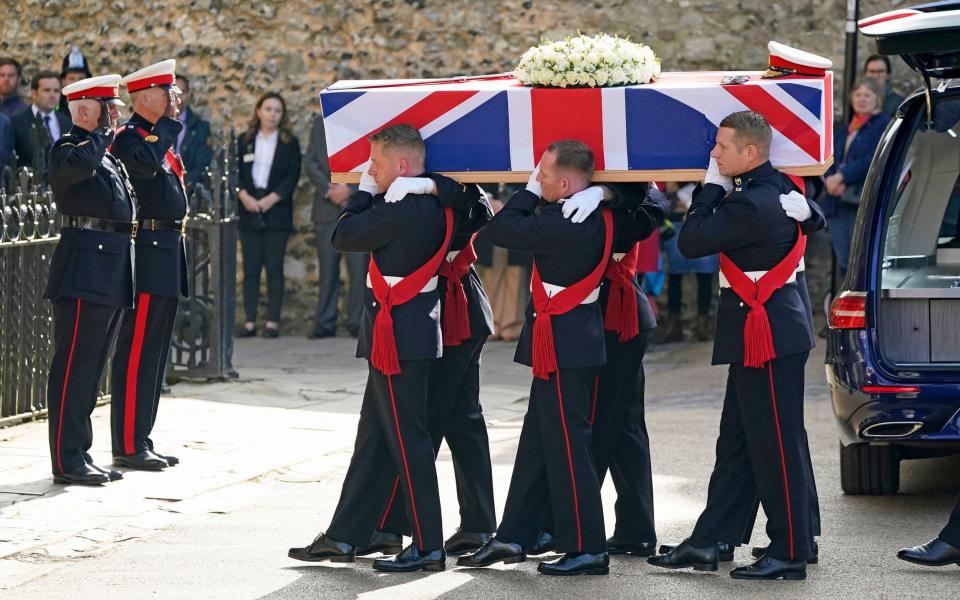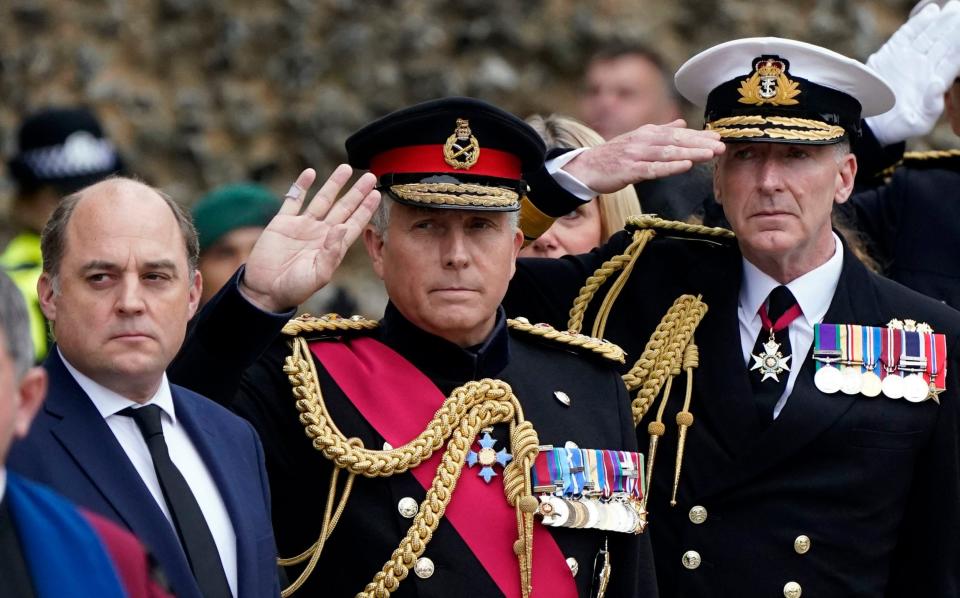Former head of Royal Marines killed himself after he was replaced by 'rival' officer and wife left him

The former head of the Royal Marines killed himself after he was replaced by a “rival” officer and his wife left him, an inquest heard.
Major General Matthew Holmes, 54, took his own life after he became “awash with stress” following the breakdown of his marriage and was told to resign from his post.
Winchester Coroners’ Court heard that, two days before his death on Oct 2, 2021, Maj Gen Holmes, who was a pallbearer at Prince Philip’s funeral, told a senior colleague: “I’ve got one last bullet to fire”.
The two-star general, who served in Northern Ireland, Kosovo, Iraq and Afghanistan, hanged himself at his £1 million marital home in Winchester two days before his wife wanted him out of the property.
Maj Gen Holmes, who was awarded a CBE in 2019, had stopped eating and sleeping and became “wholly obsessed” with his marriage, career and financial worries including school fees, his inquest heard.
The decorated officer told friends things were “indescribably s---”. One friend said he felt the Royal Navy “had belittled him” and an event celebrating his career “felt like he was attending his own execution” and was also described as a “car crash”.

After he was told to step down, he felt he had “more to give”, and on a family holiday to Cornwall was angered by the UK military’s withdrawal from Afghanistan in 2021 and worried about interpreters at risk.
Mrs Holmes told her husband she was leaving him in September that year, and Marines bosses later offered him a six-month extension at work.
She said that in spring 2021, Vice Admiral Jerry Kyd turned up to their home, where he and her husband “locked themselves” in the conservatory. “He was told he had to sign to agree or resign, which was essentially like resigning anyway,”she said.
Later that year, she told her husband she was leaving him and on one occasion found him “crying in the bedroom upstairs” with a shotgun next to him.
“I was concerned that he was in this way and that our daughter was in the next bedroom. He said: ‘My life’s not worth living without my family,’” she said.
Mrs Holmes said her husband was “out of control”, followed her and turned up late at night “demanding” that she take him back.
His sister, Sarah Adkins, said her brother “cared deeply for those he loved and the Royal Marines” and was “calm and surprised but disappointed” when his wife said she was leaving him and “in a state of denial”.
The inquest heard that Admiral Sir Tony Radakin, the head of the Armed Forces, exchanged regular messages with Maj Gen Holmes, and in one said: “I’m really sorry to hear about what's going on. We will lean in and help... Let’s look at getting a pint next week, sounds like it’s really needed.”
In a statement, he said: “His death was a shock to me and to all those that knew him and to the Navy. He was a courageous leader in Afghanistan and a first class Commandant General. His personal life had been devoted to the Corps and to the nation.”
The inquest heard Lieutenant General Rob Magowan, who took over from Maj Gen Holmes as head of the Marines, had texted Admiral Radakin to say: “Sir, we have a problem” after his predecessor’s wife had left him.

Lt Gen Magowan, the Deputy Chief of the Defence Staff, told the inquest he exchanged daily messages with Maj Gen Holmes, who told him “his life was spinning out of control”. He said: “He was wholly obsessed with his predicament... but taking his own life did not cross my mind.”
He added that he was “under pressure” to get Maj Gen Holmes to agree to a six-month extension in the Marines but he was “focusing on things spiralling out of control”.
Vice Admiral Kyd said Maj Gen Holmes remained distraught over his three-decade career ending near the time of his death and “remained anguished and said his exemplary record demanded better”.
Recalling a conversation two days before the death, he said: “He reflected on what a horrible year it had been for him and his crumbling domestic situation. He said to me: ‘I have got one last bullet to fire.’ I had no idea what he meant by that, but it did not cause concern.”
Jonathan Ball, the CEO of the Royal Marines Association, said Maj Gen Holmes felt lhe had “personally failed” friends in Afghanistan who were unlikely to escape the country, adding: “It was the way the withdrawal was carried out that distressed him.”
Mr Ball also said that there was a “rivalry between” Maj Gen Holmes and Lt Gen Magowan, adding: “Matt perceived it as salt being rubbed in the wounds. He had lost control of his life.”
Coroner Jason Pegg said Maj Gen Holmes was unhappy that he was being “superseded” by Lt Gen Magowan and the way in which his role would be carried out. He told the inquest that “it was quite clear that he was in a dark place and under stress, and his world was now upside down”.
Mr Pegg concluded Maj Gen Holmes took his own life.
In a statement, Mrs Holmes said her husband had faced “personal struggles” but was “a kind, generous man” who had “committed his life to serving in the Royal Marines”.
She said: “Alongside the demands of his career, Matt was a loving father who adored his children and would have hugely admired their resilience over the last 18 months.
“Matt was exceptionally proud to have served as Commandant General of the Royal Marines, and his service was recognised by being awarded a DSO and CBE.”

 Yahoo News
Yahoo News 